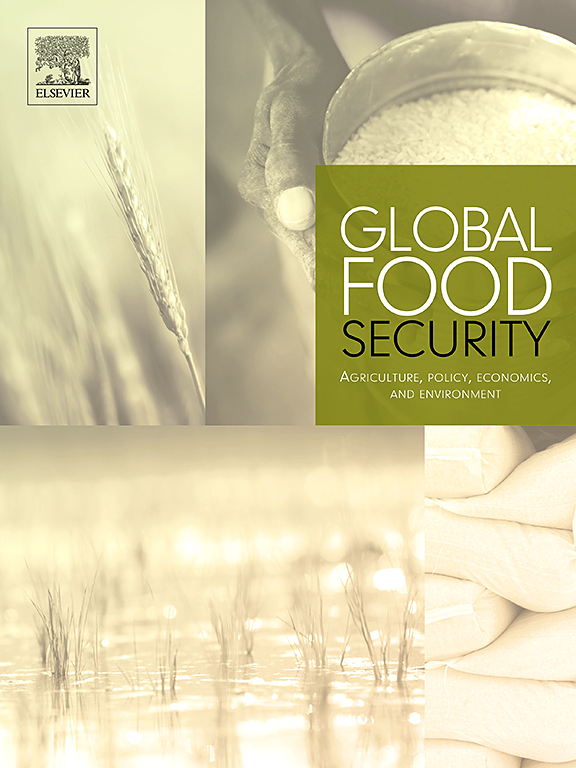使用基于方面的情绪分析来评估俄乌战争期间粮食安全危机的全球影响
IF 9.6
1区 经济学
Q1 FOOD SCIENCE & TECHNOLOGY
Global Food Security-Agriculture Policy Economics and Environment
Pub Date : 2025-01-31
DOI:10.1016/j.gfs.2025.100828
引用次数: 0
摘要
俄罗斯和乌克兰于2022年2月爆发的战争使许多国家面临严峻挑战,其中之一就是全球粮食安全问题的升级。本研究考察了战争条件如何对粮食安全产生负面影响,以及如何使用从世界各地不同国家收集的社交媒体帖子来对战争后的社会问题进行分类和检查。使用基于方面的情感分析,使用带有BERT架构的情感分类器,基于国家分析了关注点和原因。在非洲和中东,社会关注的焦点集中在无法获得食物和潜在饥荒的可能性上;在这些国家进行的其他分析表明,获得面包、婴儿食品、动物产品(牛奶、奶酪等)、面食和许多其他类别的产品已变得非常困难。世界上很大一部分人认为,战争造成的粮食安全危机可能导致经济问题和饥荒。来自波兰,特别是中欧和东欧国家的社交媒体帖子强烈关注经济问题。情绪分析研究表明,旨在确保两国粮食安全的黑海粮食倡议在全球范围内增加了24%的积极情绪。据我们所知,这项研究首次确定了全球社会层面对粮食安全和各国措施目标的关注。这项研究提出的结果可以预测社会对粮食安全的关注,并制定替代计划,在这方面对许多国家有所帮助。本文章由计算机程序翻译,如有差异,请以英文原文为准。
Using aspect-based sentiment analysis to evaluate the global effects of the food security crisis during the Russia-Ukraine war
The war that broke out between Russia and Ukraine in February 2022 has left many countries facing difficult challenges, one of which has been the escalation of global food security issues. This study examines how the conditions of war negatively reflect on food security and how social media posts collected from different countries around the world were used to categorize and examine societal concerns following the war. Concerns and reasons were analyzed based on countries using an aspect-based sentiment analysis using a sentiment classifier with the BERT architecture. In Africa and the Middle East, societal concerns are centered around the possibility of not accessing food and potential famine; other analyses conducted in these countries indicate that access to products such as bread, baby food, animal products (milk, cheese, etc.), pasta, and many other categories have become significantly challenging. A large portion of the world views the food security crisis caused by the war as potentially leading to economic problems and famine. Social media posts from Poland, especially, in Central and Eastern European countries are intensely focused on economic issues. The sentiment analysis studies show that the Black Sea Grain Initiative, aimed at securing food security between the two countries, increased positive sentiments globally by up to 24%. To the best of our knowledge, this study is the first to identify concerns stated at the societal level worldwide on food security and measure objectives by country. This study presents findings that can develop projections for assessing concerns reflected in society regarding food security and formulating alternative plans, contributing to many countries in this regard.
求助全文
通过发布文献求助,成功后即可免费获取论文全文。
去求助
来源期刊

Global Food Security-Agriculture Policy Economics and Environment
FOOD SCIENCE & TECHNOLOGY-
CiteScore
20.90
自引率
3.40%
发文量
69
期刊介绍:
Global Food Security plays a vital role in addressing food security challenges from local to global levels. To secure food systems, it emphasizes multifaceted actions considering technological, biophysical, institutional, economic, social, and political factors. The goal is to foster food systems that meet nutritional needs, preserve the environment, support livelihoods, tackle climate change, and diminish inequalities. This journal serves as a platform for researchers, policymakers, and practitioners to access and engage with recent, diverse research and perspectives on achieving sustainable food security globally. It aspires to be an internationally recognized resource presenting cutting-edge insights in an accessible manner to a broad audience.
 求助内容:
求助内容: 应助结果提醒方式:
应助结果提醒方式:


